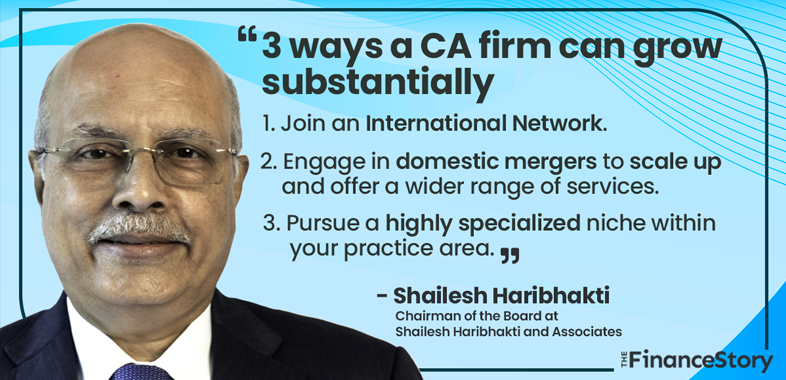- CA firms are on the lookout for ways to scale, both locally and globally. Yet, many find themselves stuck.
- How can audit and accounting firms truly thrive in an increasingly competitive market?
- We turned to CA Shailesh Haribhakti.
- At just 22, Shailesh joined his father’s firm, Haribhakti & Company, in 1978 – He grew the firm from a modest 20 members to over 1,000!
- Here’s how he did it—and how you can too.
What was your goal when you joined your father’s firm at 22?
When I joined my dad’s firm we were a small team of 20, with a rock-solid client base and profitability.
I never planned to become large. What I was planning was to become the best in a few things that we thought we could do well.
In 1980, after I returned from the US I decided to launch a brand new product – Systems Audit. In 1979, I became India’s first Certified Internal Auditor.
Over the years, we launched fault-intolerant audits, self-corrective processes, and forensic audits.
I was obsessed with starting something new which was three to five years ahead of the curve. This obsession continued for the first 25 years of my professional career.
It was our mindset of continuously innovating and adding new services that helped us transition from a small profitable firm to a fast-growing one.
You can find Shailesh’s journey here.

As someone who has successfully scaled Haribhakti & Co., what key challenges did you confront?
We had to face plenty of challenges, and many of them hold even for this generation of CA firms.
Securing extraordinary talent
I was constantly on the lookout to create a team of individuals who were more skilled than me.
Today, I advise all the upcoming CA firms to think out of the box. Don’t aim to own a larger share of a small pie; consider sharing a much larger one.
I remember, at one point, I informed my Partners that they could take home whatever income they wanted and I would take the remaining amount.
If you adopt a mindset that embraces collaboration and partnership, acquiring and retaining talent would be much easier.
Make them your partners, and inspire them with the idea of leveraging your network and contacts.
This is something I’m particularly passionate about—partnering with outstanding, academically sound, and enthusiastic young people who want to do something new. A perspective we should all gradually embrace.
Staying Updated
Another significant challenge is keeping yourself updated to stay ahead of the curve.
I remember several years ago I was invited to speak at a seminar. As I listened to the other speakers, I realized that they were far ahead of me in that particular discussion.
So, I decided to go back, relearn, and fill in the gaps in my knowledge regarding the topic.
From that day forward, I developed an obsessive desire to unlearn and relearn. This idea has stuck with me.
So how do you keep pace with new trends? It requires being a lifelong learner.
Losing a Key Person
There may come a situation when a key individual leaves your firm, which can evoke a range of emotions.
So how would you cope with it? You must rise above and do things efficiently.
Strive to become a better Partner and be more generous.
The firm not making profits
What do you do when your firm is no longer growing?
A part of you may become so invested in your firm that you’d find it difficult to let go. However, holding onto it is one of the biggest mistakes you can make.
Once you realize that it’s not working out, you should cut your losses and consider venturing out.

How should firms plan their growth strategy today?
There are usually three growth paths.
1. The most obvious path – Join an international network
We, for instance, had Partnered with three leading global accounting firms starting with, Moores Rowland, BDO, and eventually Baker Tilly. This contributed to our rapid growth.
You have to ensure that you are a good fit for the chosen network. Remember, they are not your equity partners, therefore, it’s vital not only to establish your niche and form strong partnerships but also to keep growing.
Don’t think that only a 200-member firm can become a part of an international network.
Even a 20-member highly motivated firm with a few niche areas can be extremely attractive.
Suggestions:
- Make your firm very attractive. Make yourself known by going to conferences, writing articles, and professionally presenting yourself. You will find the doors opening up.
- Start looking for smaller network firms for partnership.
- Slowly build your reputation. Your clients should be seeking you, by being ensured that if your firm commits to doing something they’ll do it on time, and efficiently.
You’ll have the true formula for success if you can align these three things.
2. Merge with local firms
The second approach is to engage in domestic mergers and establish a network of firms.
This approach, in my opinion, is particularly powerful today as it presents an opportunity to scale and offer a broader range of services.
3. Niche Specialization
I can recall plenty of individuals who have achieved remarkable success without having expansive setups, large office spaces, or hundreds of employees.
With small, dedicated teams, they’ve created super-niches that are highly profitable and serve as a pathway for growth.
For instance, a firm could focus exclusively on the litigation aspect of indirect taxes, provide specialized AI services, energy transition, or perhaps build its niche in forensics.
There are numerous sub-niches within major practice areas where one can delve in and become the best in that area.
This strategy will earn you a good reputation.

What is your advice to CAs of today who want to start their practice?
or else you will not make the cut!
For anyone starting a new firm, a traditional approach will not help you grow or become part of an international network. It’s your innovation, and adoption of AI that will make the difference.
It’s important to rethink and create a massive transformative purpose for your firm. This means thinking in terms of ‘What do I want to do to change the world and impact the lives of a billion people?’
Create your methods for achieving it, and things will fall into place.
You also don’t want to be flashy. I have led a modest lifestyle which is comfortable but not luxurious. And I am more than satisfied and happy with my decision.
When you are happy with the work that you do, then a little sacrifice in remuneration and living a humble life is enough.














